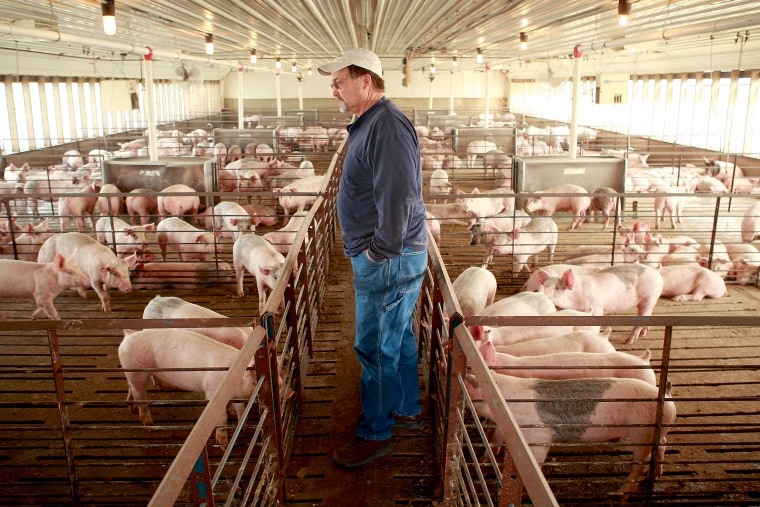U.S. pork farmers could lose at least $360 million annually, after Mexico said it would slap a massive tariff on pork imports to retaliate against President Donald Trump's aluminum and steel import levies, according to an estimate by the Iowa Farm Bureau.
Mexico, the second-largest market for U.S. pork exports, said Wednesday it would impose a 10 percent tariff on all U.S. pork products, with the tariff rising to 20 percent by July 5, a spokesperson for the Mexican Ministry of Economy confirmed to NBC News.
Mexico imported almost 650,000 metric tons of pork legs and shoulder last year, worth about $1 billion, according to government data.
Depending on how the hike is absorbed by Mexican pork producers, the new tariff could mean higher prices for Mexican consumers, lower profits for U.S. pork farmers, and loss of business to other countries. While Americans prefer ribs and bacon, pork shoulder and legs (used for ham) are central to some of Mexico's most popular dishes, including tacos al pastor and carnitas.
Ever since trade war talk heated up, pork prices have been on the decline. "It probably took pork prices from the point where hogs were slightly profitable to the point where most producers are losing money," Dave Miller, director of research for the Iowa Farm Bureau, told NBC News.
Now that tariffs are actually going into effect, the damage could be even greater — turning many farmers, some of whom were Trump supporters, into cannon fodder for his protectionist trade war.
Despite supporting the president and the idea of renegotiating trade agreements, some farmers don't like how the president is going about it.
"When we talk to farmers, a lot of them agree with the end goal, which is to rebalance tariffs that appear to be unfair. It really is unfair if we have a 2 percent tariff on cars from Germany and they have 20 percent tariffs on our cars," Miller said.
"On the other hand, we'd also rather it not get done in a tariff-based war because no one wins at that," he added — and if the tariffs continue, Mexico might start importing pork from Brazil or Canada, said Miller.
Trump appeared to brush off such criticism in a series of Twitter posts on Monday, insisting that he is imposing tariffs to protect national security and jobs.
Mexico cited the president's actions in the declaration of its tariffs and said in an earlier press release that they "will be in force for as long as the U.S. government maintains the imposed tariffs" but that the country is open to "constructive dialogue" and "rejection of unilateral protectionist measures."
Farmers in Iowa, the top U.S. state for pork production, are concerned about the financial impact — yet are holding onto hope.
Jim Boyer, a sixth-generation farmer in Ringstead, Iowa, sells 17,000 head of pork livestock a year as an independent producer. Boyer hopes that the trade war's impact will be short term and is "cautiously optimistic" for the future, noting that hog future prices are down a dollar for June and July but up a dime for December to January, his next big marketing period.
"Trump's negotiation style is different than what we are used to as livestock producers," Boyer told NBC News. "One positive thing is we're actually talking about trade," he said, adding that while he may not agree with how it has been done, "at least someone is doing something about it."
Dave Struthers, a farmer in Collins, Iowa, told NBC News that he's not prepared for these tit-for-tat tariffs. They're just another item on the list of things farmers must endure.
"We expect weather, but never really a government trade dispute. It's something new, you’ve never experienced something like it before, so you don’t have anything to draw on," he said. "I'm concerned this might be getting really bad."
Trent Thiele, a pork producer from Elma, Iowa, said his 12-year-old son is keen on farming but is worried about whether the numbers will work long term.
"I can’t expect him to come and do it for nothing or lose money every year doing it," Thiele said.
